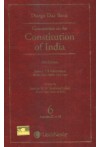- Author(s): Justice S.S. Subramani
- Publisher: LexisNexis
- Edition: 9 Ed 2016
- ISBN 13 9789351437147
- Approx. Pages 1148 + Contents
- Delivery Time Normally 7-9 working days
.........................................................................................................................
Book Description
This statement effectively means that the last word on Constitutionality is by the Judges. It implies that Judges are free to read the Constitution and adapt it as it pleases them. It contains only a kernel of the truth. However, somewhat exaggerated, the facts are that the Courts do play an important role in governing our nation because they play a central role in the interpretation of the Constitution. Judges make law. This is clearly laid down by our Supreme Court in Raghubhir Singh.' Under Article 141 of our Constitution, the law declared by the Supreme Court is binding on all courts, and this in effect becomes the law of the land. But the study of the Constitution involves much more than an examination of its judicial interpretation. The Constitution is not simply what the Supreme Court says it is. Its words are not so many empty vessels into which Justices can pour meaning. The original understanding of the founding generation is one source to understand the Constitution. Another equally indispensable source is of course, the Supreme Court, whose decisions have influenced so profoundly our understanding of the Constitution and its principles. The judges of the Supreme Court, while interpreting the Constitution, have also taken into account the aim and spirit of the Constitution. As stated by Granville Austin, the Indian Constitution is first and foremost a social document. Various decisions of the Supreme Court have also explicitly stated so. The interpretation now given to Fundamental Rights and the Directive Principles of State Policy and how they can go together, is a clear example. The jurisdiction of the Supreme Court to declare what is law is unlimited and it extends to all spheres. Naturally there is no subject which has not been dealt with by the Supreme Court and very often new questions come before it for interpretation, especially relating to the Fundamental Rights chapter of the Constitution. New interpretation becomes necessary due to various developments in the State, deluding social and economic development. Since the Constitution is a living document, new interpretations will be applied according to changing circumstances.
.........................................................................................................................
Contents
PART III
FUNDAMENTAL RIGHTS (Contd.)
Art. 25 Freedom of conscience and free profession, practice and propagation of religion
Art. 26 Freedom to manage religious affairs
Art. 27 Freedom as to payment of taxes for promotion of any particular religion
Art. 28 Freedom as to attendance at religious instruction or religious worship in
certain educational institutions
Art. 29 protection of interests of minorities.
Art. 30 Right of minorities to establish and administer educational institutions
Art. 31 Compulsory Acquisition of Property. [Omitted by the Constitution (44th Amendment)
Act, 1978, s. 6 (w.e.f. 20-6-7979
Art. 31A Saving of laws providing for acquisition of estates, etc
Art. 31B Validation of certain Acts and Regulations.
Art. 31C Saving of Laws giving effect to directive principles
Art. 31D Saving of laws in respect of anti-national activities [Inserted by the Constitution
(42nd Amendment) Act, 1976, s. 5 (w.e.f. 3-1-1977) and repealed by the Constitution
(43rd Amendment) Act, 1978, s. 2 (w.e.f. 13-4-1978)]
Art. 32 Remedies for enforcement of rights conferred by this Part
Art. 32A Remedies for enforcement of rights conferred by this Part
Art. 33 Power of Parliament to modify the rights conferred by this Part in their application to forces
Art. 34 Restriction on rights conferred by this Part while martial law is in force in any area
Art. 35 Legislation to give effect to the provisions of this Part
.............................................................................................................................

